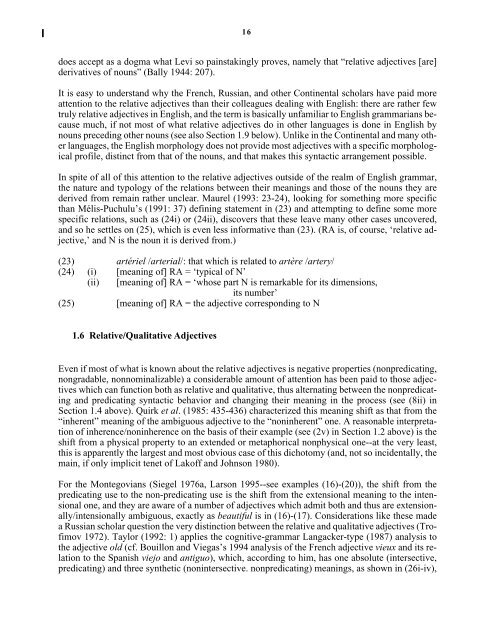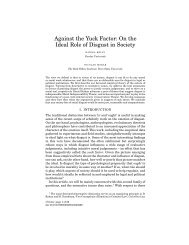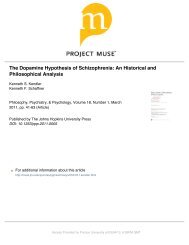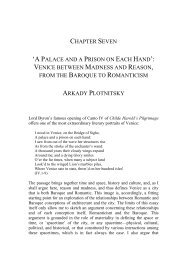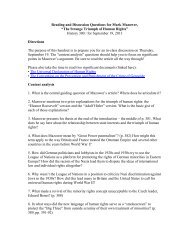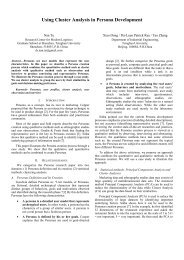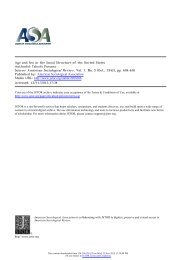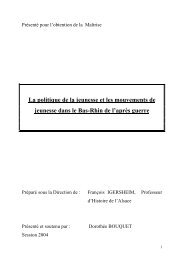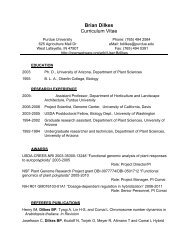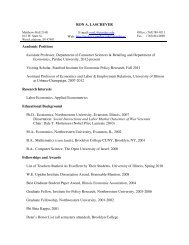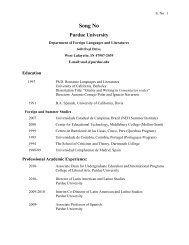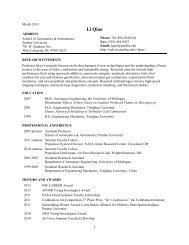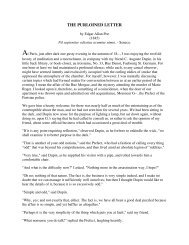Lexical Semantics of Adjectives - CiteSeerX
Lexical Semantics of Adjectives - CiteSeerX
Lexical Semantics of Adjectives - CiteSeerX
You also want an ePaper? Increase the reach of your titles
YUMPU automatically turns print PDFs into web optimized ePapers that Google loves.
16<br />
does accept as a dogma what Levi so painstakingly proves, namely that “relative adjectives [are]<br />
derivatives <strong>of</strong> nouns” (Bally 1944: 207).<br />
It is easy to understand why the French, Russian, and other Continental scholars have paid more<br />
attention to the relative adjectives than their colleagues dealing with English: there are rather few<br />
truly relative adjectives in English, and the term is basically unfamiliar to English grammarians because<br />
much, if not most <strong>of</strong> what relative adjectives do in other languages is done in English by<br />
nouns preceding other nouns (see also Section 1.9 below). Unlike in the Continental and many other<br />
languages, the English morphology does not provide most adjectives with a specific morphological<br />
pr<strong>of</strong>ile, distinct from that <strong>of</strong> the nouns, and that makes this syntactic arrangement possible.<br />
In spite <strong>of</strong> all <strong>of</strong> this attention to the relative adjectives outside <strong>of</strong> the realm <strong>of</strong> English grammar,<br />
the nature and typology <strong>of</strong> the relations between their meanings and those <strong>of</strong> the nouns they are<br />
derived from remain rather unclear. Maurel (1993: 23-24), looking for something more specific<br />
than Mélis-Puchulu’s (1991: 37) defining statement in (23) and attempting to define some more<br />
specific relations, such as (24i) or (24ii), discovers that these leave many other cases uncovered,<br />
and so he settles on (25), which is even less informative than (23). (RA is, <strong>of</strong> course, ‘relative adjective,’<br />
and N is the noun it is derived from.)<br />
(23) artériel /arterial/: that which is related to artère /artery/<br />
(24) (i) [meaning <strong>of</strong>] RA = ‘typical <strong>of</strong> N’<br />
(ii) [meaning <strong>of</strong>] RA = ‘whose part N is remarkable for its dimensions,<br />
its number’<br />
(25) [meaning <strong>of</strong>] RA = the adjective corresponding to N<br />
1.6 Relative/Qualitative <strong>Adjectives</strong><br />
Even if most <strong>of</strong> what is known about the relative adjectives is negative properties (nonpredicating,<br />
nongradable, nonnominalizable) a considerable amount <strong>of</strong> attention has been paid to those adjectives<br />
which can function both as relative and qualitative, thus alternating between the nonpredicating<br />
and predicating syntactic behavior and changing their meaning in the process (see (8ii) in<br />
Section 1.4 above). Quirk et al. (1985: 435-436) characterized this meaning shift as that from the<br />
“inherent” meaning <strong>of</strong> the ambiguous adjective to the “noninherent” one. A reasonable interpretation<br />
<strong>of</strong> inherence/noninherence on the basis <strong>of</strong> their example (see (2v) in Section 1.2 above) is the<br />
shift from a physical property to an extended or metaphorical nonphysical one--at the very least,<br />
this is apparently the largest and most obvious case <strong>of</strong> this dichotomy (and, not so incidentally, the<br />
main, if only implicit tenet <strong>of</strong> Lak<strong>of</strong>f and Johnson 1980).<br />
For the Montegovians (Siegel 1976a, Larson 1995--see examples (16)-(20)), the shift from the<br />
predicating use to the non-predicating use is the shift from the extensional meaning to the intensional<br />
one, and they are aware <strong>of</strong> a number <strong>of</strong> adjectives which admit both and thus are extensionally/intensionally<br />
ambiguous, exactly as beautiful is in (16)-(17). Considerations like these made<br />
a Russian scholar question the very distinction between the relative and qualitative adjectives (Tr<strong>of</strong>imov<br />
1972). Taylor (1992: 1) applies the cognitive-grammar Langacker-type (1987) analysis to<br />
the adjective old (cf. Bouillon and Viegas’s 1994 analysis <strong>of</strong> the French adjective vieux and its relation<br />
to the Spanish viejo and antiguo), which, according to him, has one absolute (intersective,<br />
predicating) and three synthetic (nonintersective. nonpredicating) meanings, as shown in (26i-iv),


